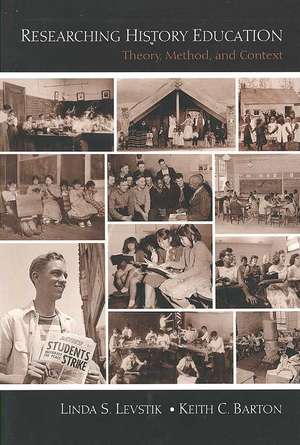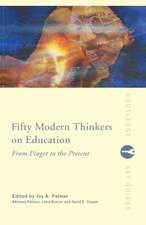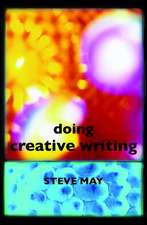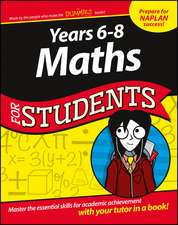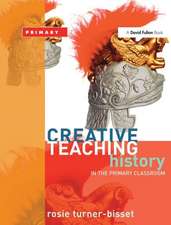Researching History Education: Theory, Method, and Context
Autor Linda S. Levstik, Keith C. Bartonen Limba Engleză Paperback – 8 feb 2008
Stephen J. Thornton, University of South Florida
Researching History Education combines a selection of Linda Levstik’s and Keith Barton’s previous work on teaching and learning history with their reflections on the process of research. These studies address students’ ideas about time, evidence, significance, and agency, as well as classroom contexts of history education and broader social influences on students’ and teacher’s thinking. These pieces—widely cited in history and social studies education and typically required reading for students in the area—were chosen to illustrate major themes in the authors’ own work and trends in recent research on history education. In a series of new chapters written especially for this volume, the authors introduce and reflect on their empirical studies and address three issues suggested in the title of the volume: theory, method, and context.
Although research on children’s and adolescents’ historical understanding has been the most active area of scholarship in social studies in recent years, as yet there is little in-depth attention to research methodologies or to the perspectives on children, history, and historical thinking that these methodologies represent. This book fills that need. The authors’ hope is that it will help scholars draw from the existing body of literature in order to participate in more meaningful conversations about the teaching and learning of history.
Researching History Education provides a needed resource for novice and experienced researchers and will be especially useful in research methodology courses, both in social studies and more generally, because of its emphasis on techniques for interviewing children, the impact of theory on research, and the importance of cross-cultural comparisons.
| Toate formatele și edițiile | Preț | Express |
|---|---|---|
| Paperback (1) | 456.75 lei 6-8 săpt. | |
| Taylor & Francis – 8 feb 2008 | 456.75 lei 6-8 săpt. | |
| Hardback (1) | 1290.53 lei 6-8 săpt. | |
| Taylor & Francis – 8 feb 2008 | 1290.53 lei 6-8 săpt. |
Preț: 456.75 lei
Preț vechi: 537.36 lei
-15% Nou
Puncte Express: 685
Preț estimativ în valută:
87.41€ • 90.92$ • 72.16£
87.41€ • 90.92$ • 72.16£
Carte tipărită la comandă
Livrare economică 14-28 aprilie
Preluare comenzi: 021 569.72.76
Specificații
ISBN-13: 9780805862713
ISBN-10: 0805862714
Pagini: 440
Ilustrații: 3 tables, 13 halftones and 1 line drawing
Dimensiuni: 152 x 229 x 22 mm
Greutate: 0.81 kg
Ediția:1
Editura: Taylor & Francis
Colecția Routledge
Locul publicării:Oxford, United Kingdom
ISBN-10: 0805862714
Pagini: 440
Ilustrații: 3 tables, 13 halftones and 1 line drawing
Dimensiuni: 152 x 229 x 22 mm
Greutate: 0.81 kg
Ediția:1
Editura: Taylor & Francis
Colecția Routledge
Locul publicării:Oxford, United Kingdom
Cuprins
@contents: Selected Contents:
Preface
Afterword
Preface
- Narrative as a primary act of mind?
Linda S. Levstik
- The relationship between historical response and narrative in a sixth–grade classroom
Linda S. Levstik
- Building a sense of history in a first grade classroom
Linda S. Levstik
- Visualizing time
Keith C. Barton
- "Back when God was around and everything": The development of children’s understanding of historical time
Keith C. Barton and Linda S. Levstik
- "They still use some of their past": Historical salience in children’s chronological thinking
Linda S. Levstik and Keith C. Barton
- Making connections
Keith C. Barton
- "Bossed around by the Queen": Elementary students’ understanding of individuals and institutions in history
Keith C. Barton
- Narrative simplifications in elementary children’s historical understanding
Keith C. Barton
- "I just kinda know": Elementary students’ ideas about historical evidence
Keith C. Barton
- What makes the past worth knowing?
Linda S. Levstik
- "It wasn’t a good part of history": National identity and ambiguity in students’ explanations of historical significance
Keith C. Barton and Linda S. Levstik
- Articulating the silences: Teachers and adolescents’ conceptions of historical significance
Linda S. Levstik
- Challenging the familiar
Keith C. Barton
- "You’d be wanting to know about the past": Social contexts of children’s historical understanding in Northern Ireland and the United States
Keith C. Barton
- A sociocultural perspective on children’s understanding of historical change: Comparative findings from Northern Ireland and the United States
Keith C. Barton
- Border crossings
Linda S. Levstik
- Crossing the empty spaces: Perspective taking in New Zealand adolescents’ understanding of national history
Linda S. Levstik
- Digging for clues: An archaeological exploration of historical cognition
Afterword
Notă biografică
Linda S. Levstik, University of Kentucky, USA
Keith C. Barton, University of Cincinatti, USA
Keith C. Barton, University of Cincinatti, USA
Recenzii
"The authors’ research is well known and among the most important American works being done on how children learn history. It is thus a great idea to gather this pivotal research in one place. The volume offers a new perspective through the authors’ reflections on the research process. It is profound without pomposity, ideal for the intended audience; the tone is just right. There really isn’t another book that does what this one does."--Stephen J. Thornton, University of South Florida
"An excellent and important book, one that should be read by anyone with even the slightest interest in the theory and practice of contemporary history education—academics, graduate students, and practitioners alike…Over the past several years, few, if any, scholars have offered as many insights into history education, particularly children’s historical understandings, as have Barton…and Levstik…With respect to instruction, RHE should prove appropriate for a variety of courses, undergraduate as well as graduate."--Kevin D. Vinson, Melissa B. Wilson & Crystal Swenson, Education Review (April 2009), Vol. 12, No. 5
"This book makes an important contribution to the conversation about history learning by making multiple studies available to a wide audience. History educators and social studies teachers, both prospective and experienced, should find this book useful."--Sara Brooks Sundberg, The History Teacher (2009), Vol. 42, Issue 3
"It is interesting to note that the authors do not limit their research techniques to a qualitative vein. Indeed, their research perspectives are wide ranging and present the reader with a variety of excellent classroom experiments."--Richard A. Diem, Teaching History: A Journal of Methods (Fall 2009), 34, No. 2: 99-100
"An excellent and important book, one that should be read by anyone with even the slightest interest in the theory and practice of contemporary history education—academics, graduate students, and practitioners alike…Over the past several years, few, if any, scholars have offered as many insights into history education, particularly children’s historical understandings, as have Barton…and Levstik…With respect to instruction, RHE should prove appropriate for a variety of courses, undergraduate as well as graduate."--Kevin D. Vinson, Melissa B. Wilson & Crystal Swenson, Education Review (April 2009), Vol. 12, No. 5
"This book makes an important contribution to the conversation about history learning by making multiple studies available to a wide audience. History educators and social studies teachers, both prospective and experienced, should find this book useful."--Sara Brooks Sundberg, The History Teacher (2009), Vol. 42, Issue 3
"It is interesting to note that the authors do not limit their research techniques to a qualitative vein. Indeed, their research perspectives are wide ranging and present the reader with a variety of excellent classroom experiments."--Richard A. Diem, Teaching History: A Journal of Methods (Fall 2009), 34, No. 2: 99-100
Descriere
Researching History Education combines a selection of Linda Levstik’s and Keith Barton’s previous work on teaching and learning history with their reflections on the process of research. These studies address students’ ideas about time, evidence, significance, and agency, as well as classroom contexts of history education and broader social influences on students’ and teacher’s thinking.
